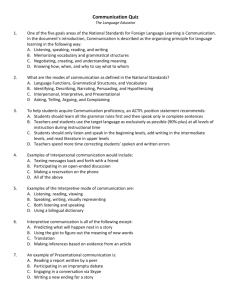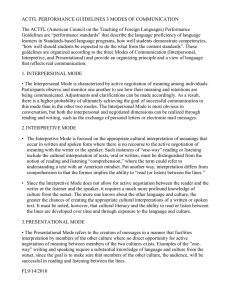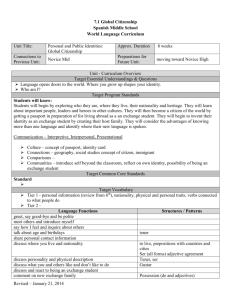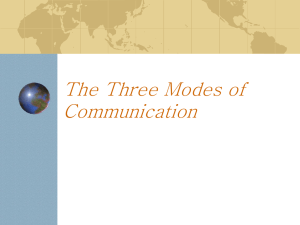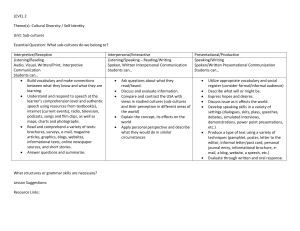Level 3 Proficiency Document
advertisement
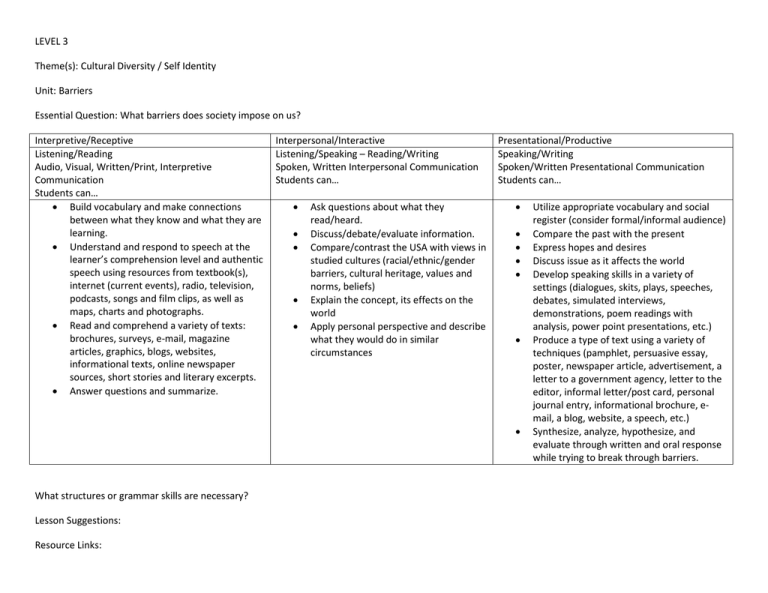
LEVEL 3 Theme(s): Cultural Diversity / Self Identity Unit: Barriers Essential Question: What barriers does society impose on us? Interpretive/Receptive Listening/Reading Audio, Visual, Written/Print, Interpretive Communication Students can… Build vocabulary and make connections between what they know and what they are learning. Understand and respond to speech at the learner’s comprehension level and authentic speech using resources from textbook(s), internet (current events), radio, television, podcasts, songs and film clips, as well as maps, charts and photographs. Read and comprehend a variety of texts: brochures, surveys, e-mail, magazine articles, graphics, blogs, websites, informational texts, online newspaper sources, short stories and literary excerpts. Answer questions and summarize. Interpersonal/Interactive Listening/Speaking – Reading/Writing Spoken, Written Interpersonal Communication Students can… Ask questions about what they read/heard. Discuss/debate/evaluate information. Compare/contrast the USA with views in studied cultures (racial/ethnic/gender barriers, cultural heritage, values and norms, beliefs) Explain the concept, its effects on the world Apply personal perspective and describe what they would do in similar circumstances Presentational/Productive Speaking/Writing Spoken/Written Presentational Communication Students can… What structures or grammar skills are necessary? Lesson Suggestions: Resource Links: Utilize appropriate vocabulary and social register (consider formal/informal audience) Compare the past with the present Express hopes and desires Discuss issue as it affects the world Develop speaking skills in a variety of settings (dialogues, skits, plays, speeches, debates, simulated interviews, demonstrations, poem readings with analysis, power point presentations, etc.) Produce a type of text using a variety of techniques (pamphlet, persuasive essay, poster, newspaper article, advertisement, a letter to a government agency, letter to the editor, informal letter/post card, personal journal entry, informational brochure, email, a blog, website, a speech, etc.) Synthesize, analyze, hypothesize, and evaluate through written and oral response while trying to break through barriers. LEVEL 3 Theme(s): Family and Community Unit: Love and Friendship Essential Question: How is love and friendship expressed throughout the world and how does it influence the individual? Interpretive/Receptive Listening/Reading Audio, Visual, Written/Print, Interpretive Communication Students can… Build vocabulary and make connections between what they know and what they are learning. Understand and respond to speech at the learner’s comprehension level and authentic speech using resources from textbook(s), internet (current events), radio, television, podcasts, songs and film clips, as well as maps, charts and photographs. Read and comprehend a variety of texts: brochures, surveys, e-mail, magazine articles, graphics, blogs, websites, informational texts, online newspaper sources, short stories and literary excerpts. Answer questions and summarize. Interpersonal/Interactive Listening/Speaking – Reading/Writing Spoken, Written Interpersonal Communication Students can… Ask questions about what they read/heard. Discuss/debate/evaluate information. Compare/contrast the USA with views in studied cultures (love and friendship, customs and traditions, dating, verbal and non-verbal communication) Explain the concept, its effects on the world Apply personal perspective and describe what they would do in similar circumstances Presentational/Productive Speaking/Writing Spoken/Written Presentational Communication Students can… What structures or grammar skills are necessary? Lesson Suggestions: Resource Links: Utilize appropriate vocabulary and social register (consider formal/informal audience) Describe what will or might be if one does not follow socially acceptable manners) Express hopes and desires for personal relationships Discuss issue as it affects the world Develop speaking skills in a variety of settings (dialogues, skits, plays, speeches, debates, simulated interviews, demonstrations, poem readings with analysis, power point presentations, etc.) Produce a type of text using a variety of techniques (pamphlet, persuasive essay, poster, newspaper article, advertisement, a letter to a government agency, letter to the editor, informal letter/post card, personal journal entry, informational brochure, email, a blog, website, a speech, etc.) Synthesize, analyze, hypothesize, and evaluate through written and oral response. LEVEL 3 Theme(s): Leisure Unit: Art Essential Question: How does art influence our everyday life? Interpretive/Receptive Listening/Reading Audio, Visual, Written/Print, Interpretive Communication Students can… Build vocabulary and make connections between what they know and what they are learning. Understand and respond to speech at the learner’s comprehension level and authentic speech using resources from textbook(s), internet (current events), radio, television, podcasts, songs and film clips, as well as maps, charts and photographs. Read and comprehend a variety of texts: brochures, surveys, e-mail, magazine articles, graphics, blogs, websites, informational texts, online newspaper sources, short stories and literary excerpts. Answer questions and summarize. Interpersonal/Interactive Listening/Speaking – Reading/Writing Spoken, Written Interpersonal Communication Students can… Ask questions about what they read/heard. Discuss/debate/evaluate information. Compare/contrast the USA with views in studied cultures (art forms, words to describe art, effects of art, socially acceptable vs. socially unacceptable art, educational system, the role of art in peoples’ lives) Explain the concept, its effects on the world Apply personal perspective and describe what they would do in similar circumstances Presentational/Productive Speaking/Writing Spoken/Written Presentational Communication Students can… What structures or grammar skills are necessary? Lesson Suggestions: Resource Links: Utilize appropriate vocabulary and social register (consider formal/informal audience) Describe what will or might be. Discuss issue as it affects the world Develop speaking skills in a variety of settings (dialogues, skits, plays, speeches, debates, simulated interviews, demonstrations, poem readings with analysis, power point presentations, etc.) Produce a type of text using a variety of techniques (pamphlet, persuasive essay, poster, newspaper article, advertisement, a letter to a government agency, letter to the editor, informal letter/post card, personal journal entry, informational brochure, email, a blog, website, a speech, etc.) Synthesize, analyze, hypothesize, and evaluate through written and oral response. LEVEL 3 Theme(s): Communication and Media Unit: Social Networking Essential Question: How do social networking sites influence society? Interpretive/Receptive Listening/Reading Audio, Visual, Written/Print, Interpretive Communication Students can… Build vocabulary and make connections between what they know and what they are learning. Understand and respond to speech at the learner’s comprehension level and authentic speech using resources from textbook(s), internet (current events), radio, television, podcasts, songs and film clips, as well as maps, charts and photographs. Read and comprehend a variety of texts: brochures, surveys, e-mail, magazine articles, graphics, blogs, websites, informational texts, online newspaper sources, short stories and literary excerpts. Answer questions and summarize. Interpersonal/Interactive Listening/Speaking – Reading/Writing Spoken, Written Interpersonal Communication Students can… Ask questions about what they read/heard. Discuss/debate/evaluate information. Compare/contrast the USA with views in studied cultures (social networking sites, censorship, political influence, mode of communication, depth of communication, socializing skills) Explain the concept, its effects on the world Apply personal perspective and describe what they would do in similar circumstances Presentational/Productive Speaking/Writing Spoken/Written Presentational Communication Students can… What structures or grammar skills are necessary? Lesson Suggestions: Resource Links: Utilize appropriate vocabulary and social register (consider formal/informal audience) Describe what will or might be Express hopes and desires Discuss issue as it affects the world Develop speaking skills in a variety of settings (dialogues, skits, plays, speeches, debates, simulated interviews, demonstrations, poem readings with analysis, power point presentations, etc.) Produce a type of text using a variety of techniques (pamphlet, persuasive essay, poster, newspaper article, advertisement, a letter to a government agency, letter to the editor, informal letter/post card, personal journal entry, informational brochure, email, a blog, website, a speech, etc.) Synthesize, analyze, hypothesize, and evaluate through written and oral response. LEVEL 3 Theme(s): Health Unit: Lifestyle Choices Essential Question: What do we base our lifestyle choices on? What motivates us? Interpretive/Receptive Listening/Reading Audio, Visual, Written/Print, Interpretive Communication Students can… Build vocabulary and make connections between what they know and what they are learning. Understand and respond to speech at the learner’s comprehension level and authentic speech using resources from textbook(s), internet (current events), radio, television, podcasts, songs and film clips, as well as maps, charts and photographs. Read and comprehend a variety of texts: brochures, surveys, e-mail, magazine articles, graphics, blogs, websites, informational texts, online newspaper sources, short stories and literary excerpts. Answer questions and summarize. Interpersonal/Interactive Listening/Speaking – Reading/Writing Spoken, Written Interpersonal Communication Students can… Ask questions about what they read/heard. Discuss/debate/evaluate information. Compare/contrast the USA with views in studied cultures (lifestyle, concepts of beauty/health/youth, body image, physical/mental/emotional well-being) Explain the concept, its effects on the world Apply personal perspective and describe what they would do in similar circumstances Presentational/Productive Speaking/Writing Spoken/Written Presentational Communication Students can… What structures or grammar skills are necessary? Lesson Suggestions: Resource Links: Utilize appropriate vocabulary and social register (consider formal/informal audience) Describe what will or might be. Express hopes and desires for our lifestyle choices. Discuss issue as it affects the world Develop speaking skills in a variety of settings (dialogues, skits, plays, speeches, debates, simulated interviews, demonstrations, poem readings with analysis, power point presentations, etc.) Produce a type of text using a variety of techniques (pamphlet, persuasive essay, poster, newspaper article, advertisement, a letter to a government agency, letter to the editor, informal letter/post card, personal journal entry, informational brochure, email, a blog, website, a speech, etc.) Synthesize, analyze, hypothesize, and evaluate through written and oral response. LEVEL 3 Theme(s): Science and Technology Unit: Genetics Essential Question: What influence has genetics on our lives? Interpretive/Receptive Listening/Reading Audio, Visual, Written/Print, Interpretive Communication Students can… Build vocabulary and make connections between what they know and what they are learning. Understand and respond to speech at the learner’s comprehension level and authentic speech using resources from textbook(s), internet (current events), radio, television, podcasts, songs and film clips, as well as maps, charts and photographs. Read and comprehend a variety of texts: brochures, surveys, e-mail, magazine articles, graphics, blogs, websites, informational texts, online newspaper sources, short stories and literary excerpts. Answer questions and summarize. Interpersonal/Interactive Listening/Speaking – Reading/Writing Spoken, Written Interpersonal Communication Students can… Ask questions about what they read/heard. Discuss/debate/evaluate information. Compare/contrast the USA with views in studied cultures (advances in medicine, genetics, cloning, ethics, laws, etc.) Explain the concept, its effects on the world Apply personal perspective and describe what they would do in similar circumstances Presentational/Productive Speaking/Writing Spoken/Written Presentational Communication Students can… What structures or grammar skills are necessary? Lesson Suggestions: Resource Links: Utilize appropriate vocabulary and social register (consider formal/informal audience) Describe what will or might be as medicine advances. Express hopes and desires for the future. Discuss issue as it affects the world Develop speaking skills in a variety of settings (dialogues, skits, plays, speeches, debates, simulated interviews, demonstrations, poem readings with analysis, power point presentations, etc.) Produce a type of text using a variety of techniques (pamphlet, persuasive essay, poster, newspaper article, advertisement, a letter to a government agency, letter to the editor, informal letter/post card, personal journal entry, informational brochure, email, a blog, website, a speech, etc.) Synthesize, analyze, hypothesize, and evaluate through written and oral response. LEVEL 3 Theme(s): Customs and Traditions Unit: Cultural Celebrations Essential Question: What aspects of our culture do we pride ourselves with during cultural celebrations? Interpretive/Receptive Listening/Reading Audio, Visual, Written/Print, Interpretive Communication Students can… Build vocabulary and make connections between what they know and what they are learning. Understand and respond to speech at the learner’s comprehension level and authentic speech using resources from textbook(s), internet (current events), radio, television, podcasts, songs and film clips, as well as maps, charts and photographs. Read and comprehend a variety of texts: brochures, surveys, e-mail, magazine articles, graphics, blogs, websites, informational texts, online newspaper sources, short stories and literary excerpts. Answer questions and summarize. Interpersonal/Interactive Listening/Speaking – Reading/Writing Spoken, Written Interpersonal Communication Students can… Ask questions about what they read/heard. Discuss/debate/evaluate information. Compare/contrast the USA with views in studied cultures (cultural celebrations and their history, changes over time, values, customs, today’s values) Explain the concept, its effects on the world Apply personal perspective and describe what they would do in similar circumstances Presentational/Productive Speaking/Writing Spoken/Written Presentational Communication Students can… What structures or grammar skills are necessary? Lesson Suggestions: Resource Links: Utilize appropriate vocabulary and social register (consider formal/informal audience) Describe what will or might be. Express hopes and desires Discuss issue as it affects the world Develop speaking skills in a variety of settings (dialogues, skits, plays, speeches, debates, simulated interviews, demonstrations, poem readings with analysis, power point presentations, etc.) Produce a type of text using a variety of techniques (pamphlet, persuasive essay, poster, newspaper article, advertisement, a letter to a government agency, letter to the editor, informal letter/post card, personal journal entry, informational brochure, email, a blog, website, a speech, etc.) Synthesize, analyze, hypothesize, and evaluate through written and oral response. LEVEL 3 Theme(s): Global Issues Unit: Poverty and Famine Essential Question: What causes poverty and famine and how can it be prevented? Interpretive/Receptive Listening/Reading Audio, Visual, Written/Print, Interpretive Communication Students can… Build vocabulary and make connections between what they know and what they are learning. Understand and respond to speech at the learner’s comprehension level and authentic speech using resources from textbook(s), internet (current events), radio, television, podcasts, songs and film clips, as well as maps, charts and photographs. Read and comprehend a variety of texts: brochures, surveys, e-mail, magazine articles, graphics, blogs, websites, informational texts, online newspaper sources, short stories and literary excerpts. Answer questions and summarize. Interpersonal/Interactive Listening/Speaking – Reading/Writing Spoken, Written Interpersonal Communication Students can… Ask questions about what they read/heard. Discuss/debate/evaluate information. Compare/contrast the USA with views in studied cultures (poverty and famine, causes, prevention, intervention, political issues, effects on the world and our personal lives) Explain the concept, its effects on the world Apply personal perspective and describe what they would do in similar circumstances Presentational/Productive Speaking/Writing Spoken/Written Presentational Communication Students can… What structures or grammar skills are necessary? Lesson Suggestions: Resource Links: Utilize appropriate vocabulary and social register (consider formal/informal audience) Describe what will or might be. Express hopes and desires Discuss issue as it affects the world Develop speaking skills in a variety of settings (dialogues, skits, plays, speeches, debates, simulated interviews, demonstrations, poem readings with analysis, power point presentations, etc.) Produce a type of text using a variety of techniques (pamphlet, persuasive essay, poster, newspaper article, advertisement, a letter to a government agency, letter to the editor, informal letter/post card, personal journal entry, informational brochure, email, a blog, website, a speech, etc.) Synthesize, analyze, hypothesize, and evaluate through written and oral response.
